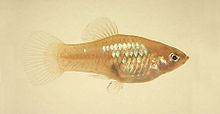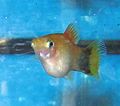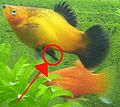- Southern platyfish
-
Southern platyfish 
Conservation status Scientific classification Kingdom: Animalia Phylum: Chordata Class: Actinopterygii Order: Cyprinodontiformes Family: Poeciliidae Genus: Xiphophorus Species: X. maculatus Binomial name Xiphophorus maculatus
(Günther, 1866)The southern platyfish, common platy or moonfish (Xiphophorus maculatus) is a species of freshwater fish in family Poecilidae of order Cyprinodontiformes. A live-bearer, it is closely related to the green swordtail (X. helleri) and can interbreed with it. It is native to an area of North and Central America stretching from Veracruz, Mexico, to northern Belize.
The southern platyfish grows to a maximum overall length of 6.0 cm (2.4 in). Sexual dimorphism is slight, the male's caudal fin being more pointed. The anal fin of the male fish has evolved into a gonopodium, a stick-shaped organ used for reproduction. The female southern platyfish's anal fin is fan shaped. Wild varieties are drab in coloration, lacking the distinctive dark lateral line common to many Xiphophorus species.
X. maculatus prefers slow-moving waters of canals, ditches, and warm springs. Omnivorous, its diet includes both plants and small crustaceans, insects, and annelid worms.
Breeders have developed a multitude of color varieties (e.g. orange, red, yellow, red/black, and black/white) which are common aquarium fish for hobbyists.
The southern platyfish is commonly known simply as the platy (pl. platys or platies), from the fish's original generic name, Platypoecilus.
Nonindigenous occurrences
This species has been recorded from Orange County, California, near Westminster; near a fish farm in Conejos County and the South Platte drainage, Colorado; several counties in Florida; Hawaii; an unnamed tributary to Big Branch Bayou in Lacombe, Louisiana; Beaverhead Rock Pond (Madison County), Montana; Clark County, Nevada; and Texas. It has also been collected in the Loiza drainage near Loiza Reservoir, Quebrada Honda, and Rio Abajo Forest Station north of Utuado in Puerto Rico.
The southern platyfish has been released probably due to fish farm or aquarium releases. Specimens in Louisiana were collected near a tropical fish farm. Southern platys, and other introduced poeciliids, have been implicated in the decline of native damselflies on Oahu, Hawaii. Often the distributions of the damselflies and introduced fishes were found to be mutually exclusive, probably resulting from predation of the fish on the insects.
In the aquarium
Platys are easy to keep and well suited to a community aquarium. They prefer water with a 7.0–8.0 pH, a water hardness of 9.0–19.0 dGH, and a temperature range of 18 to 25°C (64–77°F).
In captivity, they reach maturity in three to four months, and breed readily, the females giving birth to about 20-40 young at a time.
The fish commonly sold in pet shops is not a pure strain of X. maculatus, but is a hybrid between X. hellerii and X. maculatus. In general, if the male has a sword-shaped tail, they are called swordtails. Otherwise, they are labeled platy. Color and fin shape vary wildly in the aquarium trade.
A common statement in the trade is that it is harder to stop them breeding than to make them do so, with "surprise" fry appearing in community tanks regularly.
References
- Froese, Rainer, and Daniel Pauly, eds. (2004). "Xiphophorus maculatus" in FishBase. October 2004 version.
- "Xiphophorus maculatus". Integrated Taxonomic Information System. http://www.itis.gov/servlet/SingleRpt/SingleRpt?search_topic=TSN&search_value=165922. Retrieved 9 December 2004.
Categories:- NatureServe Secure species
- Live-bearing fish
- Ovoviviparous fish
- Xiphophorus
- Fish of Guatemala
Wikimedia Foundation. 2010.










